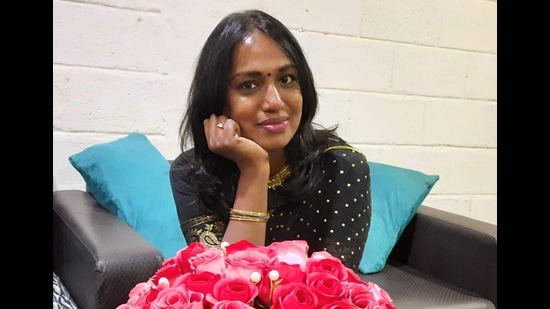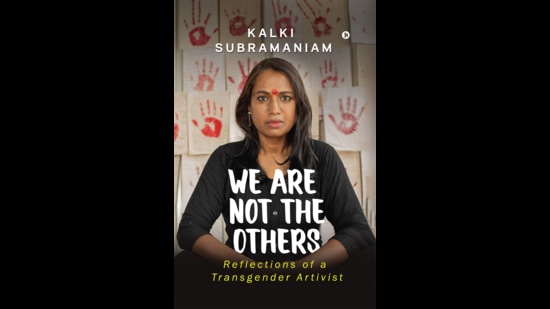Interview: Kalki Subramaniam, author, We Are Not The Others: Reflections of a Transgender Artivist
A transgender ‘artivist’, writer and actor who lives in Pollachi in Tamil Nadu, Kalki Subramaniam is also the founder of Sahodari Foundation, which works for the empowerment of transgender persons in India. Here, she talks about her new book, about the ignorance that trans people encounter, and about collaborating with trans artists from across the world.
You identify yourself as an “artivist”. What does “artivism” mean to you, and how did your journey with it begin?

I have always used innovation, technology and creativity to raise awareness and create social change. This started right from my school days when I was the editor of a handwritten magazine titled Udaya Gaanam in which I drew caricatures and cartoons on political and social issues. I also wrote plays, poems and short stories on feminism and transgender liberation.
My art is not just for entertainment. I want it to break stereotypes, question ignorance, and impact society. Many years later, I started a magazine called Sahodari for the transgender community, which had a great positive impact. I use my art to tell stories, to perform, and to act. The word “artivism” is new, and defines activism that involves art and creativity as an influential and powerful tool.
I love to create line art, paint abstracts, and make pop art. I love experimenting and I constantly keep learning and practising. As a performing artist and actor, I use my poetry and monologues to captivate my audience. I use costumes and props to make every performance a memorable experience. The Indian art world should be ready for queer art and artists. We are going to storm the next decade with our works.
How did the idea of the book We Are Not the Others: Reflections of a Transgender Artivist take shape?
I have been writing poetry, monologues, recording my conversations, and jotting down my thoughts in diaries, notebooks and note pads. Last year, during the second wave of the pandemic, I collected my writings and illustrated the poems I had written over the past seven years. I decided that they should be compiled in a book. Professor Elango Natesan from Madurai has been translating a selection of my Tamil poems into English and I thought that I should add those works to my book too because they are amazing.

Why did you choose this particular title for the book?
‘Othering’ is a big problem for us in the transgender community. For centuries, we have been labelled and defined as misfits within the norms of society. Though it is changing now, we are still victims of centuries of propaganda that pushed us towards marginalization and inequality. We wanted to belong; we are not the others, we are one of you. We want to be included and that is why I have titled the book We Are Not The Others.
Could you talk about some of the specific barriers that transgender people face while interacting with professionals from the publishing industry? What changes would you like to recommend?
My publishers saw me as a writer and never saw my gender as a problem to work with. As for the publishing industry, I haven’t heard or read any regrets or complaints from transgender authors. Publishing managers who interact with LGBTQI+ clients should have a good understanding about our community. We want to be seen for our talent and contribution, not be labelled based on our sexual and gender identities. The industry must come forward to offer more jobs to LGBTQI+ persons and must certainly have workplace policies that ensure protection and a non- discriminatory environment.
Your poem If You Don’t Mind catalogues the invasive and insensitive questions that transgender people have to face on a daily basis in relation to their bodies. Do you think these questions come from curiosity, ignorance or malice?
All the three and yes, ignorance is at the top. The questions I have been asked and the opinions shared about me to my face by insensitive people do tire me at times. But I stay strong and jolt them with a question or a satirical remark and shut them up. Malicious people are sad people; they need to be shut down. Many people need to be educated and sensitized. I understand their lack of knowledge. My poem If You Don’t Mind is a sum of all the insensitivity, malice and ignorance that transgender persons face, and it challenges male chauvinism and patriarchy.
In the poem Don’t Tell That to Me, you write, I want to shout/ I am made of/ flesh and blood, / of fear and hope, / of joy and pain. / I am like you/ I am human too.” Why do you think that transgender people face discrimination when they have existed for centuries in society, literature, and mythology?
You know, we need to be reminded of our ancient history and, as an advanced civilization, of how tolerant and inclusive we were. We have celebrated diverse gender identities and sexualities; we find evidence of it in our majestic temples, Puranas and epics. The arrival of colonialism criminalised same sex behaviour and cross dressing, and that was the beginning of oppression and the long struggle for freedom for the community. The Criminal Tribes Act introduced by the British was insensitive and inhuman. Transgender people were certainly victims of it. My poem Don’t Tell That To Me is my call to break stereotypes and to stand individually strong and unashamed of who we are.
In this book, you write, “Some fathers menstruate and some mothers can’t breast feed.” According to you, what role can artivists play in promoting trans-inclusive conversations about physical and mental health?
While leading social change, artivists are prone to stress and lack of self-care. This takes a toll on our mental and physical health. First and foremost, we artists and activists need to take care of ourselves. Only then can we be stable and sane enough to intervene, help, and support others. Artivists have big responsibilities in holding conversations on the inclusion of all oppressed people. Trans-inclusive conversations are also certainly encouraged by artivists.
In a patriarchal society, we have been conditioned to be comfortable with the dominant cis-narratives which have been taught and told to us for years. A learned and civilized society questions everything, digs for the truth, and tries to strike a balance. Some men do menstruate and get pregnant, and some women can’t breast feed because they don’t lactate. Transmen are men and transwomen are women. Millennials understand this very well.
What are some misconceptions about transgender people that you would like to correct through your book?
There are so many superstitious beliefs about the Hijra and transgender community. One needs to think rationally about what is true and what is false. People on public fora who say that transgender people are pathetic mistakes of nature really make me laugh. They are wrong. I want to tell them that we are not what they think. People need to unlearn their misconceptions and myths about us. We have always existed and we are a part of nature and we make the human race complete, beautiful and diverse. We are queer, we are here, and we are forever.
How has the Indian transgender community benefited from interacting, networking, and creating art with transgender people and allies from other parts of the world? What can Indians learn from them?
There are very few art projects in India that involve the participation of transgender artists. Sahodari Foundation is a pioneer in that. We train transgender people as artists through our several projects and we support young activists who speak out for the community. We are collaborating with transgender artists from North America, Europe and Africa and it is a beautiful and rich experience. We all learn from each other. Indians can learn so many styles and methods of working and making art.
You emphasize three different aspects of empowerment — social, political and economic — in your work with the Sahodari Foundation. To what extent has India’s Transgender Persons (Protection of Rights) Act, 2019 been able to achieve these objectives? What needs to be prioritized urgently?
The Transgender Persons (Protection of Rights) Act 2019 assures a dignified, equal and respectable life for all transgender persons including transmen, transwomen and hijras. While I am happy that it assures inclusive education and opportunities, the act does not elaborate on crimes against transgender persons. For example, it does not punish the family that abandons a transgender member. The act also does not state that those who commit a serious crime against a transgender person will be severely punished. It also does not mention transgender persons’ right to marry and adopt children.
In the poem Piece by Piece, you write, “I am not a woman by birth/ I was born as a shattered/ Rubik’s cube, / all my life I worked/step by step/ to reclaim my honour.” What advice would you like to offer other transgender people who want to tell their stories and write books?
Through this poem I want to acknowledge the struggles of young queer persons around the world, and inspire them towards hope and change. I want to be the light they are searching for. I want to be the role model they can build their lives on. I have sculpted the person I am today and I am proud of my identity and want all queer and trans persons to feel the same. To those from the queer community who want to write, this is what I say: Flaunt your talents. If you are writing about your life, tell your true story. Don’t be ashamed about it. Tell all. Let your talent as a writer be seen and read. I would be happy to mentor you.
Chintan Girish Modi is a Mumbai-based writer who tweets @chintan_connect



